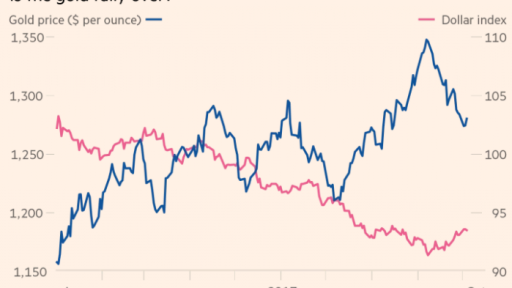- Home
- >
- Uncategorized @en
- >
- Several charts that matter for investors

Several charts that matter for investors

Is the gold rally over? Gold prices have sunk 6 per cent from their September high of $1,358 a troy ounce, amid a strengthening dollar and expectations of tax cuts by the Trump administration.
But gold’s fate will probably depend on the timing of global central bank rate rises and the speed of inflation. The dollar rally could lose steam if other central banks increase interest rates. In addition, it is still uncertain whether US president Donald Trump can get his tax cuts through Congress, which could delay a US economic recovery.
Gold is still up 11 per cent year-to-date and seems to have found a floor, inching back up to $1,276 a troy ounce this week.
Sterling and gilt yields aren’t exactly peas in a pod, but investors could be excused for expecting this correlation to occur more often than not. Bank of England hawkishness, for example, has seen the pound climb against the dollar in step with a rising two-year gilt yield.
When the correlation moves inversely, as now appears to be happening, it shows investors simultaneously dumping both sterling and gilts. That is not a good look for the UK. The market looks at Brexit and the UK economy and eyes only problems. Investors are seeing through the veneer of public displays of cabinet unity and observing mounting evidence of the impact of Brexit on business confidence and investment. September’s manufacturing and construction PMIs were disappointin
The latest proposal by the Trump administration has duly registered with markets. Aside from record high equities and a significant outperformance by small companies in recent weeks, the other interesting story is credit.
Higher US Treasury yields have been offset by tighter credit spreads in the investment grade corporate bond market as investors anticipate a lot less supply of high grade paper. The tailwinds of low inflation and expectations of a modest Federal Reserve tightening cycle have been joined by a tax reform framework that is seen reducing the amount of bonds being sold by US companies.
In recent years, some of the biggest bond sales have come from the likes of Apple and other multinational companies unwilling to bring money home at the US tax rate of 35 per cent. These companies have instead tapped bond markets to help finance dividends and share repurchases.
One sign of an ageing credit cycle: weakening investor protection standards that stores up trouble for the high yield market. During August, the quality of covenants for high yield debt suffered its biggest month-over-month recorded decline, according to Martin Fridson, of Lehmann Livian Fridson Advisors LLC. In August, Moody’s version of the index worsened by 0.49 points, to 4.54, from July’s 4.05.
Covenants are terms agreed between a company selling bonds to investors. They can include a restriction on a company selling more debt and other limits, that protect current bondholders. If these covenants are weak, they can lead to much lower recoveries for debt investors if a company is tipped into a bankruptcy or restructuring, as they can allow equity owners to strip cash and assets out of the business.
Bond investors have taken issue with a number of companies selling bonds with weaker covenants this year. Still, the market as a whole is close to its weakest covenant quality score on record — 4.61 in June 2015 — says Mr Fridson.
 Varchev Traders
Varchev Traders Read more:
If you think, we can improve that section,
please comment. Your oppinion is imortant for us.















